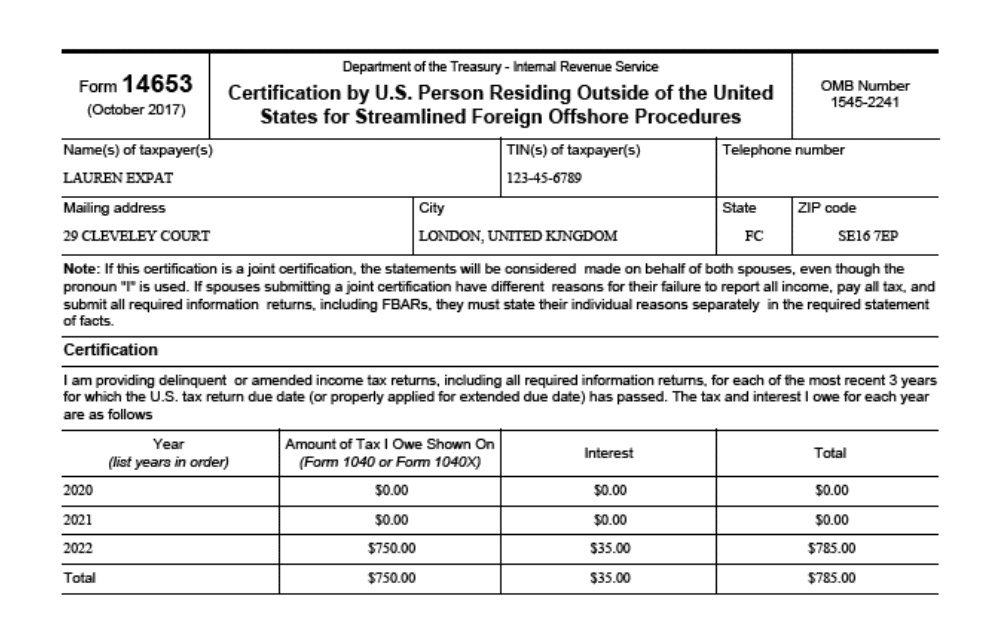Streamlined Filing Procedures: How to Catch Up on Taxes

- What Are the Streamlined Filing Procedures?
- Who Qualifies for the Streamlined Procedure?
- What Is the IRS Standard for "Willful Failure to File?”
- How to File Using the Streamlined Procedure
- What Forms Are Required for Streamlined Filing?
- What If You Don’t Qualify for Streamlined Filing?
- FAQs
- Get Caught Up with Help from Greenback
Missed filing your US taxes? Or haven’t been filing correctly? You’re not alone. Many American expats unknowingly fall behind on their tax obligations. Fortunately, the IRS offers a penalty-free way to catch up through the Streamlined Filing Compliance Procedures.
Key Takeaways
- The IRS Streamlined Filing Compliance Procedures is an amnesty program designed to allow people who were unaware of their filing requirements to come forward penalty free and get up to date on their expat taxes.
- This program requires you to file your most recent 3 years of late tax returns and 6 years of FBAR, alongside Form 14653.
- Form 14653 is a form that you need to submit to qualify for the streamlined filing program that certifies that your lack of compliance was not willful or intentional.
What Are the Streamlined Filing Procedures?
The Streamlined Filing Compliance Procedures were introduced by the IRS in 2012 to assist expats who were unaware of their tax filing obligations. This program allows eligible taxpayers to file past-due returns and required foreign financial disclosures without penalties.
The goal of the Streamlined Filing Procedures is to bring non-compliant taxpayers into good standing with the IRS without facing fines or legal consequences. Since many US expats are unaware that they are required to file an annual return, this program provides them with a straightforward way to fix past mistakes.
Key Benefits of the Streamlined Filing Procedures
- No penalties: Unlike other IRS amnesty programs, Streamlined Filing does not impose penalties for late filing.
- Simplified process: The program is designed to be straightforward and easy.
- Restored tax compliance: Successfully completing the process ensures you are back in compliance with US tax laws without additional repercussions.
Requirements:
To use the Streamlined Filing Compliance Procedures, you simply have to:
- File three years of tax returns that were either never filed or are being amended to correct mistakes.
- File six years of Foreign Bank Account Reports (FBARs) if applicable
- Submit Form 14653, a Certification of Non-Willfulness, explaining that your failure to file was accidental
Additionally, while Streamlined Filing eliminates penalties, any unpaid taxes from the three-year period may still be subject to interest charges. The IRS will review your submission, and if everything is in order, they will accept it without further penalties.
Who Qualifies for the Streamlined Procedure?
To qualify for the Streamlined Filing Compliance Procedures, you must:
- Have been outside the US for at least 330 days in at least one of the last three years
- Have unknowingly (non-willful failure) not filed past tax returns or have filed them incorrectly
- Not have been contacted by the IRS regarding an audit or investigation
You will not qualify if either of the following is true:
- Your failure to file was intentional tax evasion or tax fraud
- You have been contacted by the IRS regarding your delinquency
However, even if you don’t meet these eligibility requirements, you still have options. (More on that below.)
If you’re behind on your US taxes, you may qualify for a special compliance program to get back on track without penalties. Download our Streamlined Filing Eligibility guide to understand if you qualify.

What Is the IRS Standard for “Willful Failure to File?”
A key requirement for Streamlined Filing is proving your non-compliance was non-willful. But what does that mean?
Non-willful failure means that:
- You were unaware of your US tax obligations
- Your failure to file was an honest mistake
- You had no intent to hide income or assets
Willful failure means:
- You knew about your tax obligations but chose not to file
- You used offshore accounts to hide income
How the IRS Determines Willfulness
The IRS considers several factors when determining whether a taxpayer acted willfully in failing to meet their filing obligations.
- One of the primary considerations is past tax behavior. If you had previously filed US tax returns but then stopped, the IRS may view this as an indication of willfulness. Similarly, if you filed some returns but failed to disclose foreign assets or income, this could raise red flags.
- Another important factor is the pattern of non-compliance. A one-time mistake is less likely to be deemed willful than a repeated failure to file over multiple years. If the IRS sees a consistent pattern of neglecting tax obligations, it may determine that the taxpayer was aware of the requirements but chose to ignore them.
- The IRS also looks for signs of deliberate concealment. This could include actions such as moving money between accounts to avoid detection, failing to respond to IRS inquiries, or making false statements on tax documents. If a taxpayer went to great lengths to hide foreign assets or income, this strongly suggests willful intent.
Ultimately, the IRS will ask these questions:
- Did you previously file but later stop?
- Was this a one-time mistake or repeated?
- Did you take steps to avoid detection?
If you aren’t sure whether your case qualifies as non-willful, consult a tax professional before filing.
How to File Using the Streamlined Procedure
1. File Three Years of Past-Due Tax Returns
To catch up, you must submit three years of delinquent federal tax returns using Form 1040. These returns must include:
- All foreign and domestic income you earned during the three-year period
- Foreign tax credits or the Foreign Earned Income Exclusion (FEIE), if applicable
- Any necessary supporting forms, such as Form 2555 (FEIE) or Form 1116 (FTC)
The IRS will review these filings as part of your Streamlined submission. Accuracy is essential — any errors or omissions could result in further inquiries or audits.
2. File Six Years of Foreign Bank Account Reports (FBARs)
If at any point during the last six years, you had a total of $10,000 or more in foreign financial accounts, you must file six years of Foreign Bank Account Reports (FBARs) on FinCEN Form 114. FBARS include more than just bank accounts, they also include almost all foreign financial accounts including investment accounts, pensions, and even certain insurance policies. Failing to report foreign accounts can lead to severe penalties, even if no taxes are owed.
FBARs must be submitted electronically through the Financial Crimes Enforcement Network (FinCEN), not to the IRS.
3. Submit a Certification of Non-Willfulness (Form 14653)
A crucial part of the Streamlined Filing Procedures is proving that your tax delinquency was non-willful. You must submit Form 14653, a sworn statement explaining:
- Why you failed to file your US taxes, and why were you unaware of your obligations
- Steps you took (if any) to comply before learning about Streamlined Filing
- A declaration that your failure was not intentional tax evasion
The IRS reviews these certifications carefully, so it is critical to be truthful and precise. False or misleading statements can result in audits, penalties, or legal consequences.
4. Pay Any Outstanding Taxes and Interest
Although the Streamlined Procedure waives penalties, you may still owe back taxes from the past three years, plus interest on unpaid amounts. To avoid further accrual of interest, it’s best to pay any taxes owed at the time of filing. The IRS will calculate interest based on when the taxes were originally due.
After you submit all required documents, the IRS will review your case. Processing times typically range from 3 to 6 months, but this can vary depending on the IRS’s workload.

What Forms Are Required for Streamlined Filing?
Submitting the correct forms is essential for a successful Streamlined Filing Compliance Procedures submission. Each form serves a specific purpose in proving compliance with US tax laws:
- Form 1040: This is the standard US individual income tax return. You must file three years’ worth of past-due returns, ensuring all income is reported and applicable tax credits or exclusions (such as the Foreign Earned Income Exclusion or Foreign Tax Credit) are properly claimed.
- FinCEN Form 114 (FBAR): If you had a combined total of $10,000 or more in foreign financial accounts at any time during the past six years, you must file six years’ worth of FBARs. This applies to bank accounts, investment accounts, and foreign pensions.
- Form 14653: This is the Certification of Non-Willfulness. You must submit a detailed statement explaining why you failed to file and confirming that your non-compliance was not intentional.
- Form 2555 or Form 1116: If applicable, these forms help minimize your US tax liability. Form 2555 is used to claim the Foreign Earned Income Exclusion, and Form 1116 is used to claim the Foreign Tax Credit.
Ensuring all forms are completed accurately and submitted correctly is crucial. Mistakes or missing information can result in processing delays, IRS inquiries, or even penalties. If you are unsure about any part of the filing process, an expat tax professional can answer all your questions.
What If You Don’t Qualify for Streamlined Filing?
If you don’t meet the eligibility requirements for Streamlined Filing, there are still ways to become compliant with the IRS. Here are the most common alternatives.
1. Voluntary Disclosure Program (VDP)
If you believe your failure to file was willful, the Voluntary Disclosure Program (VDP) may be your best option. This program is designed for taxpayers who deliberately failed to report foreign income or assets and are now seeking to correct their filings.
- Provides a pathway to compliance while reducing the risk of criminal prosecution
- Involves higher penalties than Streamlined Filing but helps avoid legal consequences
- Requires a full disclosure of previously unreported income and foreign assets
2. First-Time Penalty Abatement
If your failure to file was a one-time mistake, you may qualify for First-Time Penalty Abatement. This option is for taxpayers who have a good compliance history and need relief from certain penalties.
- Best for those who missed a filing deadline but have no history of non-compliance
- The IRS may waive penalties if you have a reasonable explanation for missing deadlines
- You must request penalty relief from the IRS — it’s not automatic
3. Quiet Disclosure (Not Recommended)
Some taxpayers choose to file past-due tax returns and FBARs without formally notifying the IRS, a practice known as a “quiet disclosure.” This approach is highly risky and not recommended.
The IRS considers quiet disclosure to be an attempt to conceal past mistakes. If the IRS detects your past non-compliance before you disclose it, you may face audits and higher civil penalties. In extreme cases, you could even face criminal charges.
Consulting a tax professional is the best way to ensure compliance while minimizing risks.
FAQs
Can I Be Audited After Using Streamlined Filing?
Yes, but audits are unlikely if all filings are accurate and complete. The IRS does not specifically target Streamlined Procedures applicants, but discrepancies in filings may trigger further review.
Will I Owe Back Taxes?
You may. However, most expats can use the Foreign Tax Credit or the Foreign Earned Income Exclusion to reduce or eliminate their US tax bill. If you do owe back taxes, interest will accrue until the balance is paid.
How Long Does the Streamlined Process Take?
The IRS typically processes Streamlined filings within 3 to 6 months, but delays may occur due to workload or case complexity. If additional information is needed, the IRS may request further documentation, which can extend processing time.
What Happens If I Don’t File at All?
If you don’t file your taxes as required, the IRS can impose significant fines. If your non-filing is considered willful, the IRS may even pursue civil or criminal penalties. Interest will continue to accrue on any unpaid tax balances, increasing your bill over time.
Get Caught Up with Help from Greenback
For Americans living overseas, the Streamlined Filing Compliance Procedures provide a penalty-free way to catch up on your taxes. However, accuracy is essential. Even a minor mistake could trigger audits or further IRS inquiries. That’s where Greenback Expat Tax Services can help
Click below to schedule a consultation with one of our expat tax experts. Alternatively, contact us, and one of our customer champions will be happy to help.




